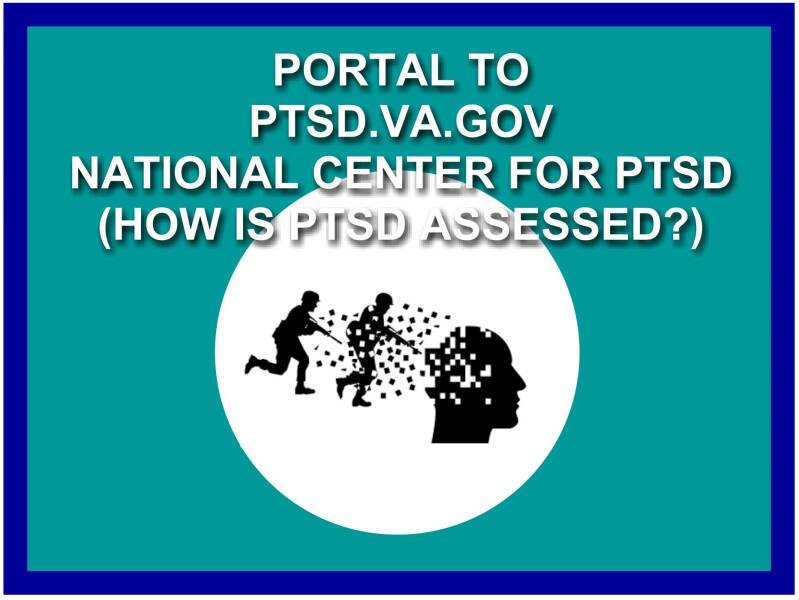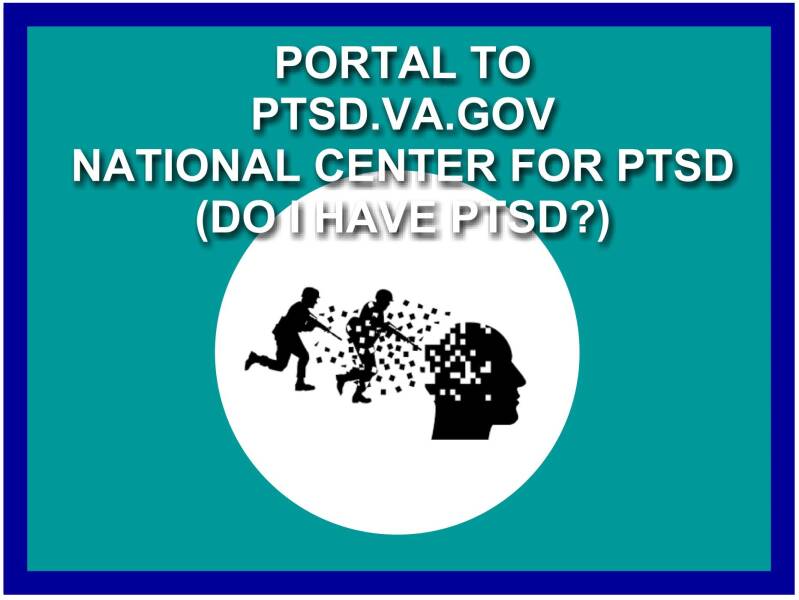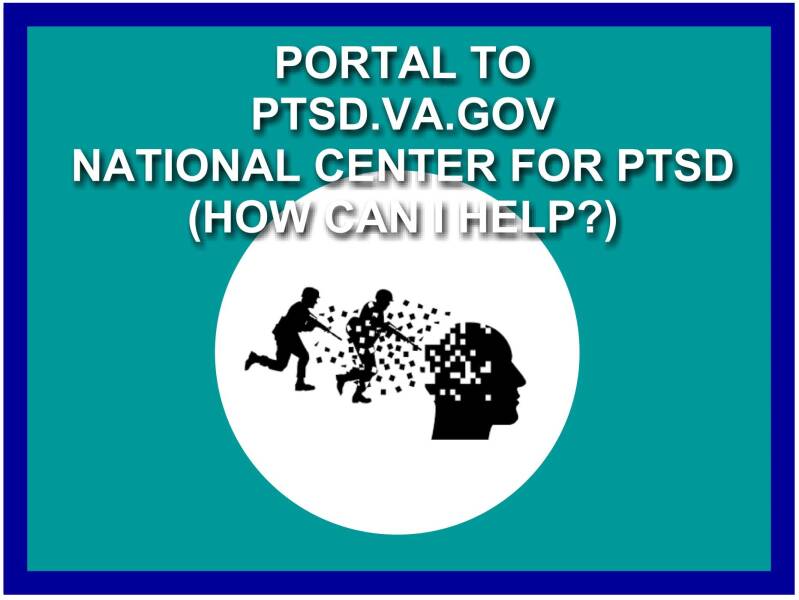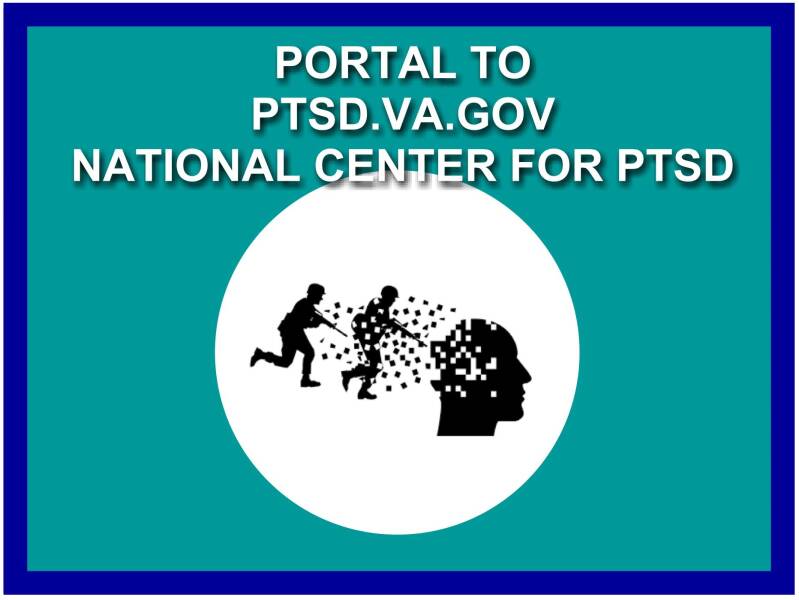Post Traumatic Stress Disorder (PTSD) is a mental health problem. PTSD can only develop after you go through or see a life-threatening event. It’s normal to have stress reactions to these types of events, and most people start to feel better after a few weeks or months.
Anyone can develop PTSD at any age. Some factors can increase the chance that someone will have PTSD, many of which are not under that person's control. For example, having a very intense or long-lasting traumatic event or getting injured during the event can make it more likely that a person will develop PTSD. PTSD is also more common after certain types of trauma, like combat and sexual assault. To learn more, click on the portal below:
Service members are exposed to traumatic events during war. Combat creates life-threatening situations, injuries and accidents. Civilians living in war zones are also at risk for trauma. Learn about research that explains the link between war, combat stress and PTSD. Combat Exposure: Stressors faced by military Service members are exposed to a number of potentially traumatic events. Find out more about stressors, and how the effects of military service can affect mental health, by clicking on the portal below:
PTSD can occur after violence. Abuse or assault may be life-threatening, cause injury and have long-term effects. Learn more about different types of violence and abuse such as military sexual trauma (MST), race-based trauma and violence that occurs in the community.
Sexual Assault is defined as any sort of sexual activity between two or more people in which one of the people is involved against their will. Find out more about sexual assault in females, males, children, military sexual trauma and rape of women in a war zone.
Racial Trauma is the result of ongoing exposure to racial stressors such as racism, racist bias, discrimination, violence against people of color, and racist abuse that creates an environment in which a person of color feels unsafe simply because the color of their skin. Community Violence happens between unrelated individuals, who may or may not know each other, generally outside the home. Examples include assaults or fights among groups and shootings in public places, such as schools and on the street. To learn more about PTSD as related to Violence and Abuse, click on the portal below:
Mass Violence refers to any traumatic event that affects many people. Terrorism and Disasters are types of mass violence. These community events can lead to death, injury, grief, fear and a need for support. At the same time, they can bring people together and build resilience. Learn about different types of man-made and natural disasters as well as act of mass violence, by clicking the portal below:
PTSD is diagnosed by a mental health provider. This may involve several steps. Learn how you can start the process, the types of measures (or assessments) used, and what to expect.
What Is a PTSD Screen? A person who went through trauma might be given a screen to see if he or she could have PTSD. A screen is a very short list of questions just to see if a person needs to be assessed further. The results of the screen do not show whether a person has PTSD. A screen can only show whether this person should be assessed further.
Fill out a PTSD self-screen on “Do I have PTSD?", by clicking the portal below:
To learn more about how PTSD is measured, click on the portal below:
When you experience a traumatic event, it is common to have an emotional reaction. Such stress reactions are normal and not weakness. Most people recover in time.
All kinds of trauma create stress reactions. People often say that their first feeling is relief to be alive after a traumatic event. This may be followed by stress, fear and anger. Trauma may also lead people to find they are unable to stop thinking about what happened . Traumatic events can create a high level of arousal—or feeling alert or "on guard"—as well, which causes people to react strongly to sounds and sights around them. To learn more, click on the portal below:
The only way to know for sure if you have PTSD is to talk with a mental health provider . There are steps you can take to get started.
After a traumatic event, it's normal to think, act, and feel differently than usual. Most people will start to feel better after a few weeks. If your symptoms last longer than a few months, are very upsetting, and disrupt your daily life, you should get help. Whether or not you have PTSD, treatment can help if thoughts and feelings from the trauma are bothering you. To learn more, click on the portal below:
When someone has PTSD, symptoms may affect family and friends. PTSD makes it hard to do everyday things and this may lead to unmet family needs. Partners and children may feel more stress and talking to one another may be tough. This section includes information about the effects of PTSD on families, children and relationships. For more details on the Effects of PTSD, click on the portal below:
You want to help someone you care about if they have PTSD. But PTSD symptoms can make people less happy or "on edge." They may have a hard time at work or at school. And they may pull away from you, even if you are family or a close friend. This section includes information to help you support a family member or friend with PTSD. There is also information about how you can help someone during PTSD treatment. For more details on "How Can I Help?", click on the portal below:
When someone you care about has PTSD, the symptoms may affect you and others too. Family and friends spend time and energy to help that person cope. Learning about PTSD will help you understand what a loved one is going through. But self-care is also very important. This section includes information and resources to help family and friends take good care of themselves as they support someone with PTSD. To learn more about "How Do I Get Support?", click on the portal below:
No matter how you served or what you’ve experienced in military or civilian life, you may be facing challenges that affect your health, relationships, and life — but you don’t have to face them alone. VA is here to provide and connect you with clinical resources and peer support to confront and manage any mental health challenge. Learn more about PTSD Treatment, by clicking the portal below:
Find support anytime day or night. To connect with a Veterans Crisis Line Responder anytime day or night:
-
Call Toll Free (800) 273-8255, then select 1
-
Start a confidential chat, by clicking the portal below:
-
Text 838255
-
If you have hearing loss, call TTY: 800-799-4889
Click On The Link Below To find a VA facility near you:


































